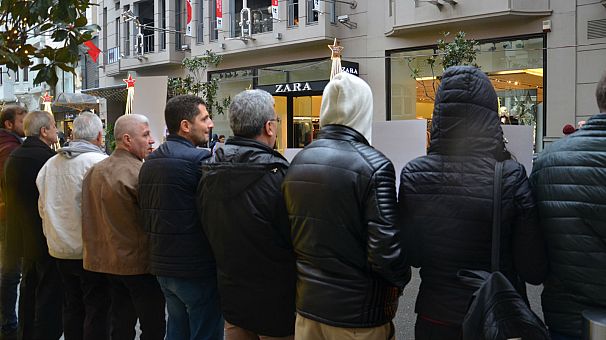In July 2016, workers producing clothes for some of Europe’s biggest fashion brands discovered that their boss had disappeared with their wages
When Hikmet Cingöz and his colleagues headed into work at a garment factory in Turkey in summer 2016, they were expecting it to be a day like any other.
Instead the workers, who produced clothes for some of Europe’s biggest fashion brands, were greeted with the realisation that they no longer had a job.
“We found the doors open and nothing left inside,” recalls Cingöz, a 47-year-old father of two who worked in the factory’s repairs department.
In the months leading up to the shock closure of the Bravo Tekstil factory and disappearance of its owner, Cingöz says he and his colleagues were denied their wages.
“When we asked for our wages during the last three months they said the factory was having a bad day but we should be a little bit patient and everything will be alright soon,” he tells Euronews.
With the factory producing clothes for Spanish fashion giants Zara and Mango, and British clothing retailer Next, many workers felt confident that the apparent financial troubles of their employer would be easily resolved.
Instead, the factory suddenly shuttered and 140 staff were left without three months of back wages and severance.
After waiting for almost a year and a half for a solution, Cingöz and dozens of his former colleagues brought the world’s attention to their plight last month when they slid pleas for help into clothes being sold at Zara shops in Istanbul.
"I made this item you are going to buy, but I didn't get paid for it,” read the tags, written in Turkish.
They also included a link to an online petition supporting the workers, which now has almost 300,000 signatures.
Bego Demir, a representative of international labour rights alliance Clean Clothes Campaign, led the dismissed workers in the guerilla campaign, which targeted Zara because the brand accounted for the majority of orders at the factory.
Demir said he came up with the idea to let consumers know what was happening after repeated efforts to lobby the brands to take action bore no results.
“The workers need this money to pay their rent and their mortgages,” he tells Euronews.
Like the other dismissed workers, Çingöz struggled to make ends meet following the closure of the factory.
Among his biggest worries during the four months it took to find a new job were paying rent and supporting his daughter’s education.
He stresses that in more than four years working at the factory for a monthly wage of 348 euros, he put everything he had into the job.
“I worked every day,” he says, adding that most days he "had to work overtime to be able to take care of my family because my wage was only little.”
Another former worker was unable to get married due to the owed money and is living in damp conditions that he can’t afford to repair, according to Demir.
A spokesman for Zara’s parent company Inditex told Euronews it had “paid all its contractual obligations to Bravo Tekstil but the factory’s owner has disappeared fraudulently.”
The spokesman said Inditex was “committed to finding a swift solution for all of those impacted” and had worked with other brands to develop a proposal to establish a “hardship fund” for affected workers, covering unpaid wages, notice indemnity, unused vacation and severance payments.
He added that the retailer was working with global union IndustriALL to try to reach an agreement with workers.
IndustriALL, however, said it had “no direct involvement” with the hardship fund.
With a solution yet to be reached, Clean Clothes Campaign’s Demir said the brands need to do more to help the workers.
“They [the brands] accept their responsibility but refuse to pay the workers. They should come to meet their workers and pay them,” he explains.
Meanwhile, Cingöz urged consumers to help the laid off workers receive what they are owed.
“I am not saying they shouldn’t shop from them [Zara] because still a lot of workers are working for them to take care of their families. I am just asking them to push Zara to pay our owed money,” he says.

